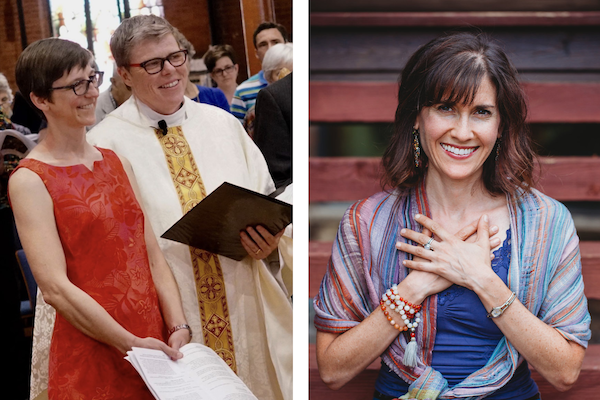Faith and LGBTQ+ communities are largely considered oil and water – they don’t mix. After all, organizations like the Evangelical Family Research Council fervently oppose queer rights, and policies nationwide threaten LGBTQ+ rights in the name of religious freedom. Queer people raised in religious communities often have psychological trauma from being deemed unnatural and sinful.
However, there’s more nuance to the dynamic between religion and queerness than negativity. The Reverend Michele Morgan, Rector of St. Mark’s Episcopal Church in Washington, D.C., and Rabbi Jessica Kessler Marshall, who practices Reform Judaism, are two of many people who prove it’s possible to happily be both LGBTQ+ and religious.
Religion in some way helped both women in the discovery and/or affirmation of their LGBTQ+ identities, and they are now proudly out LGBTQ+ leaders. While they openly acknowledge offenses of religious institutions, they want LGBTQ+ people to understand acceptance can exist within faith. One thing that might help people understand this is considering how LGBTQ+ identity and faith relate.
“Being queer is about being embraced for exactly who you are – this idea of our deepest, truest essence,” says Marshall. “That’s the message of divinity, as well… You don’t have to choose between your sexuality and connection to something higher – they’re one and the same.”
On the other side of the coin, as Morgan says, queerness also in a sense has nothing to do with being loved by God.
“I was baptized as a baby and at no point was I ever told ‘some restrictions may apply – if you come out as gay, the baptism bounces off you and you’re no longer a Christian,’” says Morgan. “That determination comes from humans, not the God I follow.”
To further help people understand religion and queerness aren’t necessarily antithetical, Morgan and Marshall note specific resources: books like “Gay the Pray Away” by the Reverend Erika Allison and “Radical Love” by Father Patrick Cheng; social media, because there’s various queer-supportive clergy online; and Soulforce, an organization combatting LGBTQI religious oppression.
People can also turn to the bible itself. Marshall says some interpretations see queer references within it. Particularly in the Garden of Eden creation story, some believe transgender and nonbinary or nongendered people are clearly included, given the nature of the first beings.
“Let’s tell that story, [not] the Leviticus 18 story,” says Marshall.
Morgan offers other ways in which the story being told can reshape the dynamic between religion and queerness. For one, she believes Sodom and Gomorrah is about hospitality, not homosexuality. Widely recasting the passage as such could nullify a critical anti-LGBTQ+ religious argument. Second, Morgan says passionate Christians’ favorite bible passages are never related to queerness – instead, they’re related to Jesus. Such passages can be a neutral discussion starting point for Christian people on opposite sides of LGBTQ+ equality.
It might be hard to believe, currently, that anti-LGBTQ+ religious people and institutions will wholly embrace queerness anytime soon. However, Marshall is hopeful.
“We can choose to see that everything is going to hell, or we can say we’re in this beautiful time of awakening,” says Marshall. “It’s the fall of the old paradigms that are no longer serving us, old structures crumbling and beautiful things coming forward.”
Morgan thinks it’s about considering a third way – e.g., not casting one religion versus another, and not thinking people can’t be both queer and hold a faith.
“I don’t really see where the break is [between my queerness and God’s love]… I can’t not be queer and I can’t not be Christian. I’m both,” says Morgan. “[We can] figure out a way that it’s both/and.”


